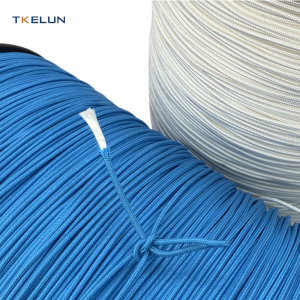♦ Inherent material properties reduce the tendency to tangle
- Ultra-low surface friction coefficient
UHMWPE fiber surface molecular chain is highly oriented and has no chemically active groups, the coefficient of friction is only 0.07-0.1 (about 1/3 of that of nylon), so that the rope has very low inter-fiber sliding resistance in dynamic use, and the probability of self-entanglement caused by friction is reduced significantly. For example, deep-sea ropes can maintain smoothness even under high water pressure.
- High Crystallinity and Chain Rigidity
UHMWPE has a molecular weight of more than 1.5 million, a crystallinity of more than 85%, and a highly ordered linear arrangement of molecular chains. This structure gives the fiber high rigidity (modulus of elasticity over 110GPa), it is not easy to deform plastically under external force, avoiding the curling and tangling phenomenon caused by the relaxation and rebound of elastic materials.
- Creep resistance and deformation memory suppression
Thanks to the strong covalent bonding of polymer chain, UHMWPE has almost no plastic creep (only 0.1-0.5%) after repeated stress. Compared with nylon and other materials, its deformation recovery rate is less than 5%, which effectively avoids the tangling problem caused by permanent bending deformation of traditional ropes due to long-term use.
♦ Structural design to block entanglement mechanisms
- Core-sheath layered anti-rotation architecture
Inner core structure:
The use of parallel arrangement of highly oriented fiber bundles, through the elimination of the traditional twisting process of the helix of the rope, completely eliminate the reverse torque-induced spontaneous rotation;
Sheath Protection:
Densely woven sheaths physically isolate the inner core fibers to reduce external friction interference (e.g., rock scuffing, tool crushing, and other factors that can trigger fiber splitting);
Comparison:
Conventional helical ropes can rotate at an angular speed of 50rpm or more when hanging freely due to the multi-layer reverse-twisted structure, whereas core-sheathed UHMWPE ropes are virtually rotation-free;
- Fiber-matrix interface optimization
The dynamic coefficient of friction is further reduced to less than 0.05 by forming a nanoscale lubrication layer on the fiber surface through a coating process.6 For example, medical sutures are treated with a surface modification that completely eliminates thread self-twisting during operation.
♦ Performance comparison with conventional ropes
| Features | UHMWPE Rope | Nylon Rope | Steel Hawser |
| Coefficient of friction | 0.07-0.1 | 0.3-0.4 | 0.5-0.8 |
| Elastic recovery rate | <5% | 15-20% | 0.1-0.5% |
| Free hanging rotation angle | <5% | 180-360° | spineless |
| Fiber exposure rate | <10%(core-sheath construction) | 100% | 100% |
♦ Application Scenario Validation
- Robotic Flex Drive:
In mechanical tendon ropes that require high-frequency bending, UHMWPE fibers achieve tangle-free deterioration after 10^6 cycles by suppressing creep and deformation memory effects;
- High-altitude rescue equipment:
UHMWPE ropes of 8mm diameter have a kink factor (strength loss rate) of only 3% when carrying a load of 1 ton, compared to 15% for Kevlar ropes of the same size;
- Nautical mooring system:
adopts UHMWPE cable with multi-strand core sheath composite structure, which can still maintain topological stability under the impact of waves, avoiding spontaneous entanglement of traditional stranded ropes due to tidal changes.
Last!!
We accept customized the materials, width, thickness,color and length. For more technical information, please contact me.
Contact: Zoey Yuan
- Email: tksales003@tkelun.com
- Whatsapp/Wechat/Tel :+86 13267352530

